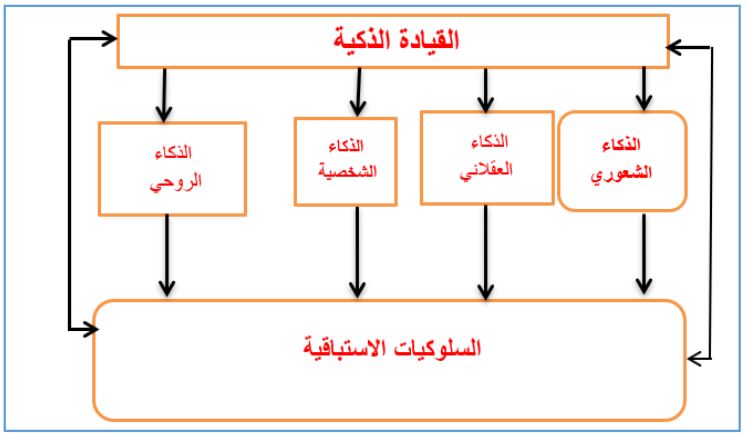The role of smart leadership in promoting proactive behavior: an applied study on a sample of employees working in the Anbar Health Department
DOI:
https://doi.org/10.71207/ijas.v20i82.2764Keywords:
Smart leadership, proactive behavior, Anbar Health DepartmentAbstract
The current research aims to demonstrate the role of smart leadership in proactive behavior and then determine the relationship of correlation and influence between them and the purpose of determining the research objective. A questionnaire form consisting of 27 paragraphs was designed and distributed to a random sample of employees working in the Anbar Health Department with 59 respondents. The data was analyzed using the SPSS program and many statistical tools were used, including the arithmetic mean, standard deviation, and regression coefficient. The most prominent results were the existence of a statistically significant correlation between the two variables and there is a strong effect of smart leadership on proactive behavior. The researcher recommended the necessity of spreading awareness and knowledge of the dimensions of smart leadership and teaching methods of developing intelligence and creativity among employees in order to contribute to enhancing proactive behavior and avoiding various crises.
References
الخفاجي الاء ثامر ,طالب علاء فرحان ,(2021) دور القيادة الذكية في تحسين جودة العملية التعليمية بحث تحليلي لاراء عينة من مدراء المدراس الحكومية في المديريى العامة لتربية محافظة كربلاء المقدسة ,رسالة ماجستير مقدمة الى كلية الادارة والاقتصاد جامعة كربلاء.
عثمان ليلى وسراي، صالح وبعلة، طاهر( 2018) القيادة الابتكارية وعلاقتها بالأداء المتميز. مجلة اقتصاديات الأعمال والتجارة، 2(5)20-
علوان عاتكة عباس ,عبدالحسين صفاء جواد(2022 ),تأثير القيادة الجديرة بالثقة في تعزيز السلوك الاستباقي للعاملين دراسة تحليلية لآراء عينة من القيادات في وزارة التخطيط العراقية ,رسالة ماجستير مقدمة الى الكلية التقنية الادارية بغداد ,الجامعة التقنية الوسطى.
المسعود منيرة عبدالله ,درويش زينب عواد (2023)القيادة الذكية كمدخل لتحقيق الميزة التنافسية لدى ادارة تعليم محافظة الخرج ,المجلة التربوية والعلوم النفسية المجلد 7 العدد 35.
Bateman, T. S., & Crant, J. M. (1993). The proactive component of organizational behavior: A measure and correlates. Journal of organizational behavior, 14(2), 103-118.
Chen, S. H., Fu, C. M., Li, R. H., Lou, J. H., & Yu, H. Y. (2012). Relationships among social support, professional empowerment, and nursing career development of male nurses: A cross-sectional analysis. Western journal of nursing research, 34(7), 862-882
Dorczak, R., & Szczudlińska-Kanoś, A. (2020). Emotions in leadership.
Dorczak, R., & Szczudlińska-Kanoś, A. (2020). Emotions in leadership. Fiedler, F. E. (1972). The effects of leadership training and experience: A contingency model interpretation. Administrative Science Quarterly, 453-470.
Griffin, M. A., Neal, A., & Parker, S. K. (2007). A new model of work role performance: Positive behavior in uncertain and interdependent contexts. Academy of management journal, 50(2), 327-347.
Haight, T. (2017). Administrators’ Perceptions of Teacher Evaluation Practices and the Changing Role of Principals Utilizing Charlotte Danielson’s Framework for Teaching, (Doctoral dissertation, College of Saint Elizabeth).
Linsky, M., & Heifetz, R. A. (2002). Leadership on the Line. Harvard Business School.
Luekitinan & Wannapa, (2014), "Organization Climates and Individual Innovation", Advances in Management & Applied Economics, Vol. 4, No.1, PP.123-135.
Matton, j (2013). Intelligent Leadership: Wath You Need To Know To Unlock Your Full Potential, Printed In USA.
Mattone, John Global.Ing : (2017) Intelligent Leadership – All You Need To Know.
Morrison, E. W. (2014), "Employee voice and silence",Annual Review of Organizational Psychology and Organizational Behavior, Vol.1,No.1, PP.173–197
Myler, Larry, (2014), "Innovation Is Problem Solving...And A Whole Lot More", Opinions expressed by Forbes Contributors are their own., JUN 13.
Parker, S. K., & Bindl, U. K. (2016). Proactivity at work: A big picture perspective on a construct that matters. In Proactivity at work (pp. 19-38). Routledge.
Parker, S. K., & Collins, C. G. (2010). Taking stock: Integrating and differentiating multiple proactive behaviors. Journal of management, 36(3), 633-662.
Parker, S. K., Bindl, U. K., & Strauss, K. (2010). Making things happen: A model of proactive motivation. Journal of management, 36(4)), 827-856)
Parker, S. K., Williams, H. M., & Turner, N. (2006). Modeling the antecedents of proactive behavior at work. Journal of applied psychology, 91(3), 636.
Presbitero, A. (2015), "Proactivity in career development of employees: The roles of proactive personality and cognitive complexity", Career Development International,Vol.20,No.5,PP.525538.
Searle, T. P. (2011), " A multilevel examination of proactive work behaviors:Contextual and individual differences as antecedents",Dissertation submitted to gain the degree of " Doctor of Philosophy", University of Nebraska.
Singh & Jyotsna,(2013) " Impact of Spiritual Intelligence on Quality of Life " International Journal of Scientific and Research Publications, Vol 3, pp.1-6.

Downloads
Published
How to Cite
Issue
Section
License
Copyright (c) 2024 College of Administration and Economics - University of Kerbala

This work is licensed under a Creative Commons Attribution-NonCommercial-NoDerivatives 4.0 International License.
Authors retain the copyright of their papers without restrictions.









